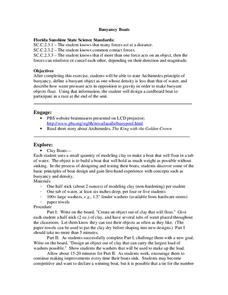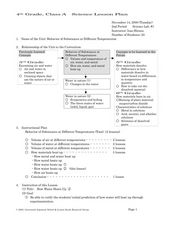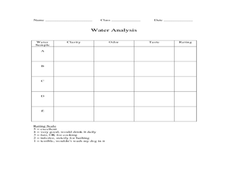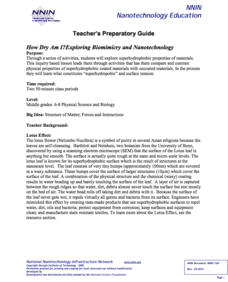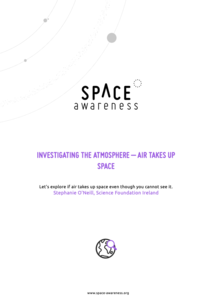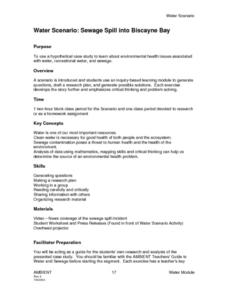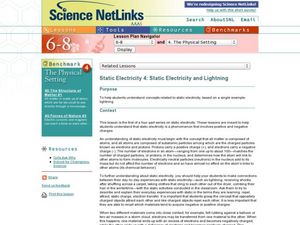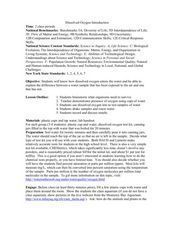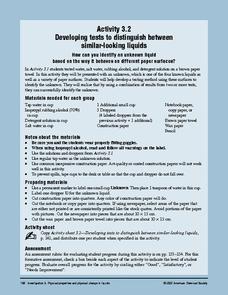Center for Precollegiate Education and Training
Buoyancy Boats
What did the sea say to the boat? Nothing, it just waved. An inquiry-based lesson starts with a simple concept on the Archimedes Principle and challenges pupils to make something out of clay that floats. Then, they design an object out...
Chicago Botanic Garden
Micro-GEEBITT Climate Activity
A truly hands-on and inquiry based learning activity bridges all the lessons in the series together. Beginning with a discussion on average global temperatures, young meteorologists use real-world data to analyze climate trends in order...
Curated OER
How Water Heats Up
Fourth graders conduct experiments heating water. In this inquiry-based early chemistry lesson, 4th graders use the materials given to experiment with the process of heating water. Students draw conclusions based upon their findings...
Center for Learning in Action
Water – Changing States (Part 2)
Here is part two of a two-part instructional activity in which scholars investigate the changing states of water—liquid, solid, and gas—and how energy from heat changes its molecules. With grand conversation, two demonstrations, and one...
Curated OER
Bottled Water vs. Tap Water
Learners analyze the similarities and differences between tap water and bottled water. They make informed decisions about their use of each. Students are asked if they drink mostly tap water straight from the tap or water fountain. They...
Curated OER
Is Our Water Healthy?
High schoolers test water for a least one chemical characteristic. They hypothesize how a storm event might change the chemical characteristics of a stream. Students collect water samples and use the chemical test to test the water.
Curated OER
Walking Magic
Students conduct experiment with water striders by placing the insect in two different solutions and discuss their observations. They discover that weight and surface area are important factors in their experiment.
National Nanotechnology Infrastructure Network
How Dry am I? Exploring Biomimicry and Nanotechnology
Help your classes feel like they can walk on water! An engaging inquiry-based lesson has young scholars experiment with different surface coatings. They make observations about their properties and how they relate to the surface tension...
Nevada Outdoor School
Let It Snow! Let It Melt!
Winter weather offers a great opportunity to teach young scientists about the states of matter. This activity-based lesson includes a range of learning experiences, from experimenting with the rate at which ice melts to singing a song...
Science 4 Inquiry
The Ups and Downs of Populations
Life has its ups and downs ... especially if you're an animal! Biology scholars engage in a population study through an inquiry-based instructional activity. Pupils work together to explore the factors that affect deer populations, then...
Space Awareness
Investigating the Atmosphere - Air Takes Up Space
How do you know there is air? Can you see it, smell it, feel it? To begin the investigation, learners watch a video and discuss what they know about air and the atmosphere. Then, they participate in five different hands-on, inquiry-based...
National Nanotechnology Infrastructure Network
Creating and Testing Silver-Nanoparticle Socks
Antibacterial socks are a product of nanotechnology. An inquiry-based lesson asks collaborative groups to create their own antibacterial socks and then test them against other products on the market. The sock with the least amount of...
Curated OER
Sewage Spill into Biscayne Bay
Students use a hypothetical case study to learn about environmental health issues associated with water, recreational water, and sewage. They use an inquiry-based learning module to generate questions, draft a research plan, and generate...
US Environmental Protection Agency
Sea Level: On the Rise
With the global temperature on the rise, the effects of climate change are starting to be seen. However, many people have a difficult time conceptualizing the long-term effects, such as sea levels rising. Given an easy and effective...
Curated OER
"Croak" Science Mystery
Solve the mystery of a declining frog population! Lead your junior ecologists on an investigation that simulates actual events concerning pollution, predation, poaching, and more. Investigators read a story online, then analyze survey...
Pyro Innovations
Beach Exploration
Little ones will absolutely love this instructional activity. It's all about the beach and what they can find while sifting through the sand. A large bucket of sand filled with hidden items is brought into the classroom. Learners will...
Curated OER
Amazing Water Changes
Students explore the properties of water and how it changes states. In this kindergarten to 2nd grade science lesson, students pair a hands-on science activity with two suggested books. This inquiry lesson has extension activities to...
Los Angeles Unified School District
River Systems
Scholars must react to the ecosystems of a river. They use inquiry-based learning along with maps and visuals to better understand the impact of rivers on everyday life. To finish, they create final written projects and presentations.
PBS
Cloud Clues
It's cloudy with a good chance of learning! An inquiry-based lesson begins with an exploration of transparent, translucent, and opaque materials. Young scientists then connect their learning to the different cloud types as they take the...
Curated OER
Dissolved Oxygen Introduction
Students are shown how dissolved oxygen enters the water. They are taught the difference between a water sample that has been exposed to the air and one that has not. Students brainstorm what organisms need to survive. They use dissolved...
Curated OER
The Aquatic Environment
Fifth graders focus on the various types of fish living in different water environments. In groups, they research the different methods used to fish and participate in experiments to determine the effects of mercury on fish, the...
Curated OER
Top 10 Summer Science Lesson Plans
Make this summer an exciting learning experience for your students with these engaging science activities!
American Chemical Society
Developing Tests to Distinguish Between Similar-Looking Liquids
Each group talks about how to test unknown liquids based on their findings in the previous experiment. In this second of four activities, they test unknowns on wax paper, newspaper, and construction paper. As a stand-alone, this lesson...
Curated OER
Runoff: Intro to Watersheds
Learners are taught that a watershed is, what types of basic land cover are impermeable and permeable to water. They trace the flow of water around their school and around their home. Students determine what watershed their school is a...


